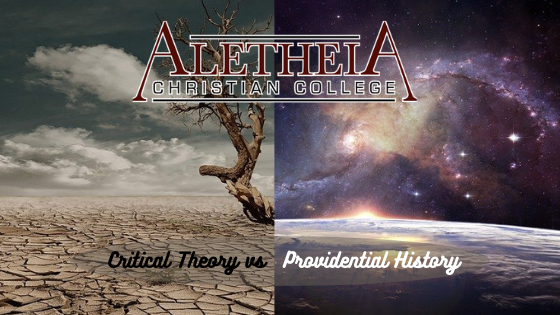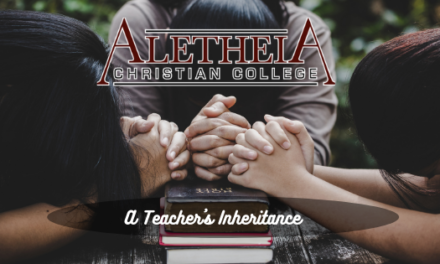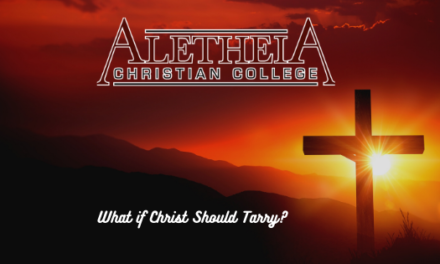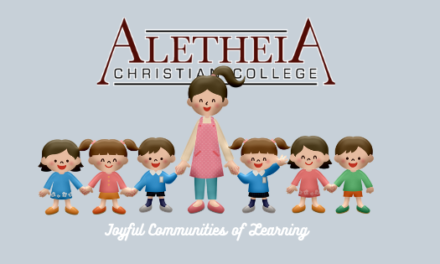If you open the average textbook in America’s public schools or listen to the news or Democrat politicians, you are likely to hear about all the problems in America.
One enterprising educator created an entire curriculum off the following statement: America was founded by white supremacists through the African slave-trade. She called her system the 1619 Project. This project endeavors to re-frame all of American history in the terms of slavery.
Critical Theory
The method of history she uses is called Critical Theory and it is a common methodology used by many teachers and professors in the American school system (both public and traditional private).
As an academic institution, Aletheia engages with the critical methodologists in dialogue and debate but we do not teach critical theory as a system for our students to use in historical, biblical, or educational analysis. Before I dive into Aletheia’s preferred method of interpretation, I want to recommend you read more about the 1619 project from those who support critical theory and from those who don’t support the 1619 project.
Definitions
Critical theory, simplified, is a system of analysis that attempts to remove objective standards and criticize society based on the subjectivity of minority groups (Critical Theory: A Very Short Introduction).
This is a form of Marxist and Hegelian dialectics or discussion that attempts to create new things, or a synthesis, out of destroying previous ideas with new ones, or thesis and anti-thesis.
Providential Theory, which Aletheia uses is defined in two historical moments.
The first was Paul’s sermon found in Acts 17:
“He made from one every nation of mankind to live on all the face of the earth, having determined appointed times and the boundaries of their habitation, 27 that they would seek God, if perhaps they might grope for Him and find Him, though He is not far from each one of us; 28 for in Him we live and move and exist, as even some of your own poets have said, ‘For we also are His children.’”
The second was a speech that Benjamin Franklin made at the Constitutional Convention:
“I have lived, Sir, a long time and the longer I live, the more convincing proofs I see of this truth — that God governs in the affairs of men. And if a sparrow cannot fall to the ground without his notice, is it probable that an empire can rise without his aid?”
Aletheia’s Historical Methodology
Now, a Providential Approach to history and education must also include moral criticism and creative understanding. When we look at God’s hand in history, humanity’s response to Him and to each other, and the cause/effect systems that make 1+1=2, this is the fundamental understanding of Aletheia’s methodology.
Moral Criticism, What’s That?
Yes, I did use the word criticism. When it comes to our moral actions, we must think critically.
Our moral standard is defined by the law of nature and nature’s God (Declaration of Independence). We are obligated to criticize our own actions and the actions of others using that objective standard.
The 1619 Project engages in racial prejudice, pre-judging history on the basis of race; simultaneously it condemns the United States for being racist.
At Aletheia, we acknowledge sins of the past and the present while attempting to walk the straight and narrow way, following the best of science, where race is an artificial construct, and religion, where God made all peoples from one “echad.”
“Do not judge so that you will not be judged. For in the way you judge, you will be judged; and by your standard of measure, it will be measured to you. Why do you look at the speck that is in your brother’s eye, but do not notice the log that is in your own eye?”
Matthew 7:1-3
In this scripture, Jesus warns us of judging others. But he warns us to not judge people for something we are doing.
Critical theorists judge hypocritically when they use Marxist dialectics and “subjective truth.”
If there is no objective standard on race or sexuality, who can say that racism is wrong?
I see this thought process playing out in the streets of America today. People are upset about serious race relations, but instead of finding a solution, they burn down stores owned by the very racial group the protestors say they are helping. Then American thought-leaders in the media, in academia, and in politics justify the violence.
Although there is a time for violence and a time to refrain from violence (Ecclesiastes), Critical Theorists are not interested in true dialogue and debate over these issues. Instead of debate, we see leaders justifying violence because the mob is supposedly on the right side of history, working to tear down the systemically racist institutions of the United States.
The mob becomes judge, jury, and executioner of their own subjective set of critical laws.
Teaching a Higher Standard
Aletheia teaches that each individual is an image-bearer of the ultimate creator.
It is that image and our ability to engage in moral dialogue that sets us apart from mere animals. That image holds individuals in particular and humanity in general to a higher standard.
Critical Theory destroys the very standards necessary for true criticism and produces violence and chaos.
A Providential and Moral Theory raises standards and calls us to live a higher life.




